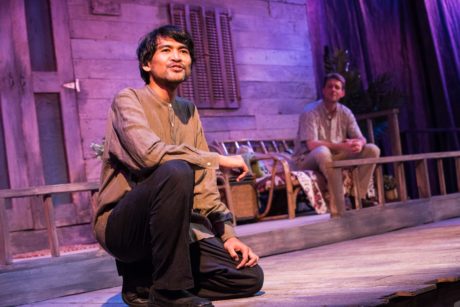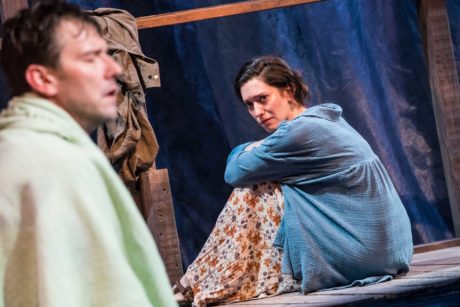There are mysteries of belief and faith beneath this fascinating parable of a play, roiling like the seawater that churns below the wooden house where its action takes place. This house is built on stilts on the coast of a small island in Indonesia. The sounds of water lapping and surf breaking and the liquid reflections of light upon its moving surface never cease.
Part cross-cultural collision, part family melodrama, part theological thriller, part audacious myth-making, Rorschach Theatre’s Forgotten Kingdoms contains such rich content it’s like riding a rip tide.

Playwright Randy Baker grew up in Singapore, grandson of a missionary, and he has set this play at the home of an American missionary based loosely on his grandfather and the stories Baker remembers he told. But beyond that biographical mooring and Baker’s lived familiarity with the locale, Forgotten Kingdoms is an act of fictive imagination that immerses its audience’s attention like a Williams or O’Neill.
David Holiday is the missionary, played by Sun King Davis with pitch-perfect preacher’s zeal, demons within to boot. His wife, Rebecca Holiday, has dutifully followed him to this remote outpost with not nearly his enthusiasm. They met in a bar in Yakima, Washington, when he was a lush and a lothario. She, already a Christian, was working there as a bartender and determined to save him. She succeeded, he turned into an impassioned man of the cloth, and now she’s stir-crazy-stuck in this house on stilts, a stay-at-home mom for their troubled and troublesome son, Jimmy, whom she calls, not inaccurately, “weird.” Susceptible to seizures, he sometimes wanders off alone without warning. (He is played with eerie authenticity by Jeremy Gee; we can believe he may be haunted, as locals say). Natalie Cutcher captures Rebecca’s conflicted affection for her husband and frustrating concern for Jimmy along with her ongoing anger and bitterness. As Rebecca puts it one point, “Hell is getting what you want.”
Hinted at there are the makings of the hellish domestic confrontation that blows up in Act Two like an electrical storm, in a scene played with gale force by Davis and Cutcher. Their dispute—about, among other things, who saved whom—delivers a jolt to the play that raises all the wattage thereafter

Act One is more measured and methodical as Baker sets forth the engrossing cross-cultural conflicts and theological arguments that underlie the action. Playing antagonist to David’s Christian triumphalism is a local named Yusuf bin Ibrihim, who is Muslim and whose wife and father attend David’s Sunday services. From Yusuf we learn of the island’s culture, the kingdom that was displaced and suppressed by colonialist kingdoms from one country after another.
We also learn David has healing powers. Or maybe doesn’t. Depends who is telling the story. And who is changing it. This is among the conundrums of faith and belief that wash ashore in Forgotten Kingdoms like messages in bottles.
Yusuf’s father is dying—an offstage death that will come to be resonant with religious symbolism. And Yusuf has a strangely simpatico connection with Jimmy, who at the end figures into the religious symbolism in a breathtakingly mythic way. In the performance of Indonesian actor Rizal Iwan, Yusef is given a very moving, very soulful presence that grounds the play’s provocative spirituality.

Just before intermission there’s a shocker, the gasp-out-loud kind. This precipitates the arrival in Act Two of a fifth character, a member of David’s congregation named Officer Togar, on official investigative business, played solidly by Vishwas.
Director Cara Gabriel conducts the panoramic scope of this play with orchestral dimension. The set by Debra Kim Sivigny, who also did costumes, is alone worth the trip to H Street to see this show. (The aroma of fresh-sawed lumber lingers in the air, testament to the hand-wrought stagecraft on display.) Lighting Designer Tyler Dubuc makes this ever-flowing world beside the sea seem real. And Sound Designer Justin Schmitz, whose eloquent water effects underscore all, composes an opener for each act with the sort of stirring music that typically begins big movies.
I cannot say for certain what Forgotten Kingdoms is “about.” But I sensed at every turn there is an ocean of meaning within it—like an ebb and flow of stories and emotions that touch on faith and belief yet never explain it, never contain it. And just how deep is that ocean can be known only by diving in.
Running Time: Two hours, including one intermission.
Forgotten Kingdoms plays through May 21, 2017, at Rorschach Theatre performing at Atlas Performing Arts Center, The Paul Sprenger Theatre – 1333 H Street NE, in Washington, D.C. For tickets, call the box office at (202) 399-7993 ext. 2, or purchase them online.
LINK:
Conversations with Five Makers of ‘Forgotten Kingdoms’ at Rorschach Theatre by





